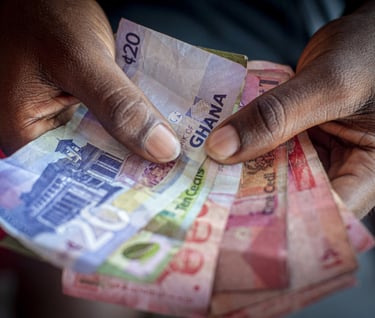
Implications and Suggestions for Addressing Mishandling of Ghanaian Currency Notes
The issue of currency note mismanagement in Ghana and how it affects the nation's economy, public health, and perception. Improper handling of cash notes, including physical harm, filthy habits, forgery, and hoarding, presents serious problems that necessitate quick action. The various forms of currency misuse are examined in this article, along with their repercussions and suggestions for how to solve the problem and encourage Ghana's money to circulate more sustainably and effectively.
Bernard Badu-Acquah PhD
5/29/20235 min read



This essay looks at the issue of currency note mismanagement in Ghana and how it affects the nation's economy, public health, and perception. Improper handling of cash notes, including physical harm, filthy habits, forgery, and hoarding, presents serious problems that necessitate quick action. The various forms of currency misuse are examined in this article, along with their repercussions and suggestions for how to solve the problem and encourage Ghana's money to circulate more sustainably and effectively.
Introduction
Because they serve as a store of value, a means of transaction, and a representation of a country's sovereignty, currency notes are essential to every economy. Currency notes must be handled and stored properly to preserve their integrity and guarantee their continued usability. However, there are significant issues with Ghana's extensive misuse of currency notes, which has an effect on the nation's economy, public health, and reputation overall.
Techniques for Mismanaging Currency
2.1 Material Injury Currency notes are prone to shredding, soiling, defacing, and excessive folding, among other physical problems. When these faults occur to currency notes, their durability and integrity are compromised, making them useless. Damaged note disposal and replacement prices rise, hampering the economy's ability to operate efficiently and possibly resulting in legal issues during transactions.
2.2 Unsanitary Behavior The regular exchange of money provides a means for the spread of diseases. Unhygienic practices including using contaminated money, handling notes with dirty hands, and storing currency in unsanitary places all help germs, viruses, and other dangerous microbes proliferate. Given the prevalence of cash transactions in Ghana, this problem assumes special importance and poses a risk to the general public's health.
2.3 Fake products The economy and public faith in the monetary system are seriously threatened by counterfeit money. The purpose of counterfeit notes is to trick people into thinking they are real forms of payment. The value of legal cash is reduced by counterfeiting, which also undermines trust in financial institutions and slows economic expansion. Ghana has had instances of circulation of fake cash, needing strong steps to stop this illicit activity. Hoarding
2.4 The excessive collection of currency by individuals is referred to as hoarding. This behavior is frequently motivated by a lack of confidence in the financial system or worries about upcoming economic uncertainty. Hoarded money is taken out of circulation, which reduces liquidity and lowers the amount of money that can be used for transactions. This conduct hinders economic activity, lessens the impact of monetary policy, and widens already existing social divides. The effects of improper currency handling The economy of Ghana suffers severely when money notes are handled improperly. Currency note physical deterioration reduces operational effectiveness of central and commercial banks by raising the cost of creating and replacing the notes. The resources used to create new banknotes and remove damaged ones could have been put to better use on other worthwhile endeavors. Additionally, currency fraud damages the country's currency's value and trust, which could result in economic instability and deter foreign investment. The handling of cash notes in an unsanitary manner raises public health issues. Due to the frequent exchange of cash, infected notes can help spread bacteria and viruses, especially in places with a high population density and during epidemics. Addressing these public health issues requires promoting appropriate hygiene habits and increasing awareness of the dangers of using dirty money. Misuse of currency notes can have an impact on a country's reputation and image overseas. A nation's economic stability and financial management may be questioned if there is a large prevalence of dirty or damaged currency as well as the circulation of counterfeit notes. Such beliefs can undermine public faith in the country's financial system and deter foreign investment. They can also have an effect on trade relations. Advice on How to Handle Currency Mishandling
4.1 Public awareness campaigns
Campaigns to educate the public about correct cash handling procedures must be extensive and ongoing. These commercials ought to stress the value of cleanliness and hygiene when handling cash. Public service announcements, educational materials, and focused outreach initiatives can help to spread healthy financial habits and stop the spread of contagious diseases.
4.2 Better Durability and Design of Banknotes
Ghana ought to work with money printing firms to create stronger banknotes with better security measures. The security and integrity of the currency can be greatly improved by using cutting-edge technology like holograms, watermarking, and special inks, which can also deter efforts at currency fraud and increase the useful life of currency notes.
4.3 Routine Inspection and Disposal of Currency To detect damaged, defaced, or counterfeit notes and quickly remove them from circulation, it is essential to have a systematic and frequent currency inspection method. The collecting and destruction of obsolete currency notes should be handled by central banks according to ecologically responsible standards. Effective inspection methods can be facilitated by training bank workers and deploying automated currency sorting machines.
4.4 Promotion of cashless payments Increasing the usage of electronic payment systems might lessen the need for actual cash and lower the dangers of currency fraud. The effectiveness, security, and transparency of financial transactions can be improved by promoting the use of electronic payment systems, online transactions, and mobile banking. To boost adoption and utilization of cashless payment methods, the government should give incentives, public-private partnerships, and infrastructure development top priority.
4.5 Improving Law Enforcement
Law enforcement efforts must be stepped up in order to effectively address currency fraud and other crimes linked to counterfeit goods. This calls for investing in specialized training programs, arming law enforcement personnel with cutting-edge technologies for counterfeit identification, and cultivating relationships with international organizations to share knowledge and best practices. To preserve public confidence in the financial system, laws and regulations pertaining to cash handling and counterfeiting must be strictly enforced.
Ghana needs to address the issue of improper handling of currency notes right now. The suggestions made in this article can help create a currency circulation system that is more efficient and long-lasting. Ghana may lessen the negative consequences of money mishandling by encouraging safe currency handling practices, enhancing the design and durability of currency, conducting routine inspections, increasing cashless payment options, and stepping up law enforcement operations. Through these measures, the economy will be strengthened, the public's health will be protected, and the nation's standing as a trustworthy financial system will grow on a global scale.
Bernard Badu Acquah is a highly accomplished Scholar with extensive experience in branding and advertising. He is widely known for his creative solutions and his passion for building and developing brands. Write your text here...


Bernard's Latest Blog Posts

